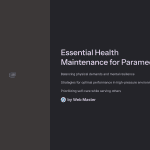 Working night shifts as an EMT can be physically and mentally exhausting, but with the right strategies, you can maintain your performance and well-being. This guide will help you survive and thrive during late-night emergencies.
Working night shifts as an EMT can be physically and mentally exhausting, but with the right strategies, you can maintain your performance and well-being. This guide will help you survive and thrive during late-night emergencies.

Mastering Your Sleep Schedule for Night Shifts
One of the biggest challenges of night shifts is managing sleep. A disrupted sleep cycle can lead to fatigue, poor decision-making, and even long-term health issues.
- Create a Consistent Sleep Routine: Try to go to bed and wake up at the same time, even on your days off.
- Use Blackout Curtains and Eye Masks: Block out daylight to mimic nighttime conditions.
- Reduce Noise: White noise machines or earplugs can help create a quiet sleeping environment.
- Avoid Caffeine Before Sleep: Limit coffee and energy drinks several hours before bedtime.
- Take Strategic Naps: A 20–30 minute nap before a night shift can boost alertness.

Nutrition Tips to Keep You Energized
What you eat can have a huge impact on your energy levels and overall health during night shifts.
- Eat a Balanced Diet: Focus on protein, fiber, and healthy fats to maintain energy.
- Avoid Heavy Meals at Night: Large meals can cause sluggishness.
- Stay Hydrated: Dehydration leads to fatigue and headaches.
- Snack Wisely: Nuts, yogurt, and fruit are great choices for sustained energy.
- Limit Sugar and Processed Foods: They cause energy crashes and mood swings.

Managing Fatigue During Long Night Shifts
Fatigue is one of the biggest risks for EMTs on night shifts. Staying alert is crucial for patient safety and your own well-being.
- Move Around Regularly: Walking or stretching every hour helps maintain circulation.
- Use Bright Lights: Exposure to light helps regulate your internal clock.
- Engage in Mental Stimulation: Listen to music or podcasts during breaks.
- Stay Social: Talking with coworkers keeps you engaged and reduces drowsiness.
- Know Your Limits: Recognize the signs of extreme fatigue and take action.

Mental Health and Stress Management
Working overnight can be mentally draining, so it’s essential to take care of your mental health.
- Practice Mindfulness and Meditation: Helps reduce stress and improve focus.
- Talk About Your Experiences: Sharing with colleagues or a support group can help.
- Maintain Work-Life Balance: Set boundaries between work and personal time.
- Seek Professional Support: If stress becomes overwhelming, talk to a mental health professional.
- Find Time for Activities You Enjoy: Hobbies and socializing can help maintain a positive mindset.

Safety Precautions for EMTs on Night Shifts
Working at night can pose additional safety risks. Taking the right precautions can help keep you safe.
- Stay Aware of Your Surroundings: Always be alert, especially in unfamiliar locations.
- Keep Emergency Contact Information Handy: In case of an accident or attack.
- Wear Reflective Gear: Ensure visibility in low-light conditions.
- Secure Your Equipment: Keep medical bags and supplies easily accessible.
- Have a Partner System: Work in pairs whenever possible.

Conclusion: Thriving in Night Shift EMT Work
Surviving night shifts as an EMT is all about balance—getting proper rest, eating well, managing stress, and staying alert. By implementing these strategies, you can improve your performance, maintain your health, and provide the best care to patients.
*Capturing unauthorized images is prohibited*







